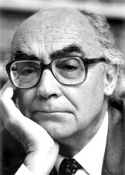Skip to: site menu | section menu | main content
Welcome To Democracy And Socialism .Com
Things should be made as simple as possible, but not any simpler- Albert Einstein
Jose de Sousa Saramago (1922-2010) |
 |
On June 18th 2010, Jos» Saramago, the Portuguese writer, poet and journalist passed away in his home in Lanzarote, one of Spain’s Canary Islands.
Saramago was the first Portuguese to win the Nobel Prize in literature in 1998.
Saramago was born on November 16th, in Azinhaga, a village in central Portugal, into a family of landless peasants. In 1924 his family moved to Lisbon, where his father started working as a policeman. Although Saramago was a good pupil with excellent marks, his parents reached the conclusion that they could not continue on keeping him in the grammar school. The only alternative was to send him to a technical school. Saramago as a child experienced and witnessed overt and painful poverty in a country with vast colonies all around the world, Portugal. Some times they had to share a small house with other families. Malnutrition and disease took the lives of many children, amongst them Saramago’s two year old brother. During that period, Salazar’s fascist government was consolidating its power in Portugal. Saramago sympathized with the resistance movement and began participating in political activities. He got fired and unemployed for political reasons in 1949, but thanks to the goodwill of a former teacher at the technical school, he managed to find work at the metal company where he was a manager. He moved from one job to another, worked as a car mechanic, as a translator and then as a journalist while studying and self educating himself. In 1959, Saramago joined a Lisbon publishing company, as a production manager; meanwhile he translated French classics to earn extra money. In April 1975, he filled the post of deputy director of the morning paper Diario de Noticias until he was sacked in the aftermath of the changes provoked by the politico-military coup of November 25th, which blocked the revolutionary process of the Carnation Revolution of 1974. As a result he decided to continue his career as a full-time novelist.
Saramago published his first novel, Terra do Pecado (Country of Sin) in 1947. But he abandoned writing novels for about 19 years because he thought that he had nothing worthwhile to say. Then Saramago combined myths and surrealism with the history of his country in most of his novels. After his comeback in 1984 he wrote, “The Year of the Ricardo Reis”, in 1986 “The Stone Raft”, in 1988 “Baltasar and Blimunda”, and in 1991 “The Gospel According to Jesus Christ”. In this novel, Saramago portrays Jesus as a fallible human who falls in love with Mary Magdalene. His views outraged the country’s’ religious establishment and provide pretext for Portugal’s conservative government to bar Saramago’s work from competition for the European Literary Prize. In opposition to the right-wing government censorship, Saramago with his Spanish wife Polar Del Rio moved to Lanzarote, where he resided until his death.
Saramago published the novel “Blindness”, in 1995, in the same year he was awarded the Camoes Literary Prize for his outstanding achievements in Portuguese language literature. He wrote more than 30 novels, books of poetry, plays and essays in over 60 years. His works were translated in more than 25 languages.
Saramago was an ardent defender of the rights of working class, poor and oppressed peoples of the world. He was a humanitarian, a pacifist, an advocate of human rights, and supporter of the Palestinians and Western Sahara causes. Saramago was part of the underground resistant movement against Salazar’s fascist regime (1932-1974). In 1969 he became a member of the forbidden Portuguese Communist Party and remained so until his death. He actively participated in the Carnation Revolution of April 25, 1974; a revolution that effectively changed the fascist regime of Portugal to a democracy.
In recent years Saramago was active in anti-war movements. He condemned imperialist wars on Afghanistan (2001), Iraq (2003), and Israeli aggressions against Lebanon (2006), and Gaza (2008). He even visited Ramallah, West Bank in 2002 and strongly condemned the plight of Palestinians inflicted by the hand of Israeli forces.
On June 20th, 2010, thousands of people, some carrying red carnation flowers, symbols of the 1974 Revolution passed by his coffin in Lisbon and mourned his loss. Two days of official mourning were declared by the Portuguese government. His ashes have been scattered in Azinhaga and in Lanzarote.
His other famous works:
Skylight (1947)
Os Poemas Possiveis (1966)
Provavelmente Alegria (1970)
Deste Mundo e do Outra (1971)
A Bagagem do Viajante (1973)
As Opinioes que o DL teve (1974)
The Year of 1993 (1975)
Os Apontamentos (1976)
Manual of Painting and Calligraphy (1977)
Objecto Quase (1978)
Levantado do Chao (1980)
Journey to Portugal (1981)
The History of Siege of Lisbon (1989)
All the Names (1997)
The Tale of the Unknown Island (1997)
The cave (2001)
Children’s’ Picture Book (2001)
The Double (2003)
Seeing (2004)
Don Giovanni Ou o Dissoluto Absolvido (2005)
Death with Interruptions (2005)
Memories of My Youth (2006)
The Elephant’s Journey (2008)
Cain (2009)
The Notebook (2009)